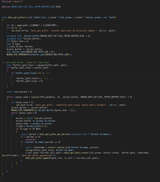>>106038824
Eh I'm too lazy to set up and maintain a public server and hosting/deploying the app. Way too much effort.
>>106038824
>gpgpu ic C
Well Mesa is now including opencl. Their opencl implementation is written in Rust.
https://gitlab.freedesktop.org/mesa/mesa/-/tree/main/src/gallium/frontends/rusticl
I wonder what you can do with C that you can't do in Rust. Rust has a good understanding of x86 platforms since it has its native intrinsics built-into the core/stdlib
use std::arch::x86_64::*;
// SSE
let a = _mm_set1_epi32(5);
let b = _mm_set1_epi32(10);
let result = _mm_add_epi32(a, b);
// AVX
let avx_vec = _mm256_set1_ps(3.14);
// Runtime CPU feature detection
if is_x86_feature_detected!("sse3") {
// Use SSE3 instructions
}
if is_x86_feature_detected!("avx2") {
// Use AVX2 instructions
}
unsafe fn bmi_examples() {
let x = 0b11010000u32;
// ANDN: AND NOT - clear bits set in y from x
let y = 0b11110000u32;
let result = _andn_u32(y, x); // 0b00000000
// BLSR: Reset lowest set bit
let reset_lowest = _blsr_u32(x); // 0b11000000
}
unsafe fn popcount_example() {
let x = 0b11010101u32;
// Count number of set bits
let count = _popcnt32(x); // Returns 5
// For 64-bit values
let y = 0xFFFFFFFFu64;
let count64 = _popcnt64(y); // Returns 32
}
unsafe fn fma_example() {
let a = _mm256_set1_ps(2.0); // [2.0, 2.0, 2.0, 2.0, 2.0, 2.0, 2.0, 2.0]
let b = _mm256_set1_ps(3.0); // [3.0, 3.0, 3.0, 3.0, 3.0, 3.0, 3.0, 3.0]
let c = _mm256_set1_ps(1.0); // [1.0, 1.0, 1.0, 1.0, 1.0, 1.0, 1.0, 1.0]
// Compute (a * b) + c in single operation
let result = _mm256_fmadd_ps(a, b, c);
}
fn optimized_popcount(x: u32) -> u32 {
if is_x86_feature_detected!("popcnt") {
unsafe { _popcnt32(x) }
} else {
x.count_ones() // Fallback to software implementation
}
}
All of these are built-in. You don't lose any control at all as you can always use inline asm












































